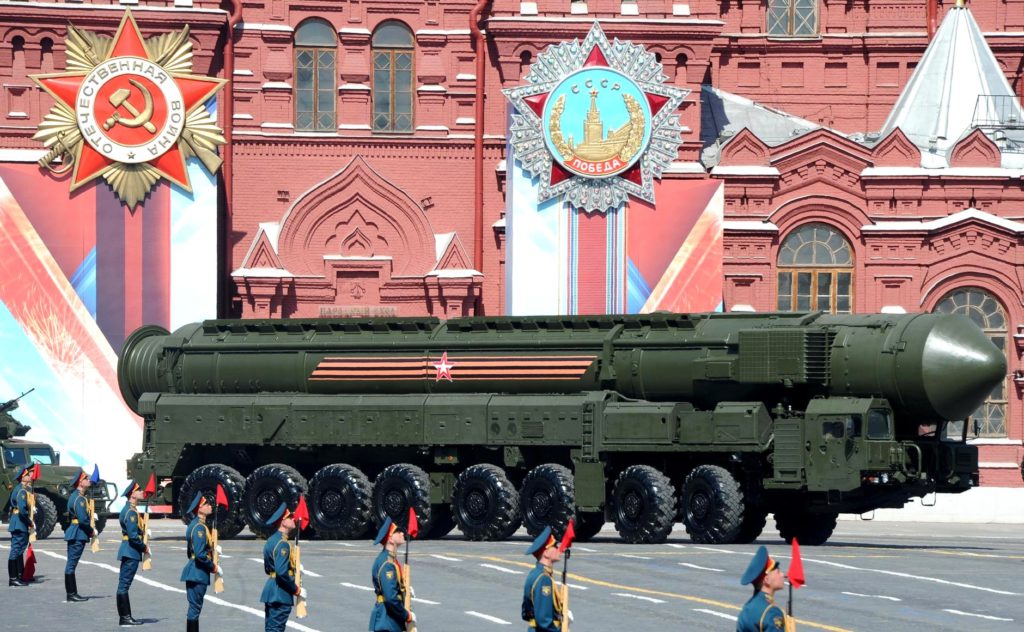Opinion: Nuclear War Is The Most Local Of Issues

Military parade on Red Square, Moscow in 2016. Photo: Wikimedia Commons
The following column appeared previously in the Daily Hampshire Gazette.

We live in a troubled time. Climate changes which we have dreaded for decades are happening now. Ironically, both droughts and floods are causing major migrations in all parts of the world. Americans fear the loss of their democracy, some because they believe that the 2020 election was rigged and an illegitimate president is in the Oval Office, others because voter suppression and violence are giving us a foretaste of fascism. Russia’s invasion of Ukraine puts Europe’s largest nuclear power plant on the front line of a major war.
It is hard to know where to turn our attention. Should we be working on a political campaign? Should we be raising money for any of countless worthy causes? For me, one issue overshadows all others. About 30 years ago, the Pioneer Valley chapter of Physicians for Social Responsibility sponsored a youth baseball team. The kids taught me an important lesson. When they were allowed to choose the words on their uniforms, they chose: “Nuclear war is bad for the future of baseball.”
Nuclear war is the most local of issues. Nuclear annihilation will wipe out your favorite cause, whatever it is. Baseball parks, food warehouses, transportation facilities, and medical infrastructure, including hospitals, clinics, pharmacies, and the professionals who work there will all be vaporized in the first second of a nuclear blast. We all have frightening mental pictures of the bombs that destroyed Hiroshima and Nagasaki in 1945, but those pictures are misleading. The modern bombs in the arsenals of Russia, the United States, and other countries are far more powerful and far more destructive than the bombs used at the end of World War II.
As a physician I was taught the principle that when there is no cure for a condition we must focus on prevention. There is no possible medical response to nuclear war. No level of risk is acceptable. Ending the risk of nuclear annihilation is vital whether you are young or old, Republican or Democrat, military or civilian, urban or rural. President Reagan said, “Nuclear war cannot be won and must never be fought.” Former Secretary of Defense William Perry, Secretary of State George Shultz, Secretary of State Colin Powell, and even General George Lee Butler, commander in chief of the U.S. Strategic Command with responsibility for all Air Force and Navy strategic nuclear forces expressed the same opinion.
The United States was the world’s only nuclear power until 1949 when the U.S.S.R. exploded its first atomic bomb. Since that time there have been at least six episodes when the two countries came close to launching nuclear weapons in the false belief that they were under attack by the other side. We did not avoid nuclear war based on the wisdom of the leaders in Washington and Moscow. As former U.S. Defense Secretary Robert McNamara has said, we avoided nuclear war because of luck. These weapons are not keeping us safe. On the contrary, we will not be safe until the weapons are dismantled.
The United Nations Treaty on the Prohibition of Nuclear Weapons went into effect last year. It is now illegal to build, house, use, or even threaten to use nuclear weapons. On the website of Back from the Brink, preventnuclearwar.org, you can find a simple, practical five-step plan to rid the world of nuclear weapons. As Dr. Ira Helfand of the International Campaign to Abolish Nuclear Weapons has said, “We built them with our own hands. We know how to take them apart.” What we need is the political will.
In the 1980s many cities and towns in western Massachusetts participated in the Nuclear Freeze which led the U.S. and the U.S.S.R. to reduce their nuclear arsenals by half. More recently, many municipal and state government bodies have endorsed Back from the Brink’s call. These include Amherst, Cummington, Easthampton, Goshen, Leverett, Northampton, Springfield, and Williamsburg. Boston, Cambridge, and Worcester are on the list. I am pleased to report the latest nearby city to endorse the call this month: Holyoke’s City Council by unanimous vote with the support of Mayor Garcia.
If your city or town is not on the list, please contact your elected representatives. If they feel that matters of defense policy are not for our small municipalities to decide, remind them that nuclear war is bad for the future of baseball.
Dr. Henry W. Rosenberg lives in Northampton
